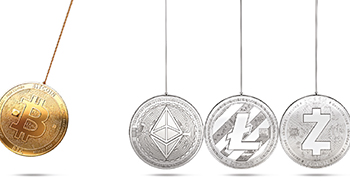 WILL THE REAL USE FOR CRYPTOCURRENCIES PLEASE STAND UP?
WILL THE REAL USE FOR CRYPTOCURRENCIES PLEASE STAND UP?
Cryptocurrencies started as payments systems, Then became niche financial assets. Now, especially for the Channel Islands, their underlying technology is driving efficiencies in finance, reports Paul Bryant
Cryptocurrencies have been on a wild ride. Investor frenzy in 2017 drove the price of Bitcoin – the most common cryptocurrency – to jump by 22 times. Then, in 2018, its price collapsed by 70%.
Nouriel Roubini, Professor of Economics at New York University’s Stern School of Business (who predicted the global financial crisis), told the London Speaker Bureau this year: “I have called cryptocurrencies the mother and father of all bubbles now gone bust. The crypto bubble has burst for good and will not recover as these were assets with no intrinsic value.”
But the story just won’t go away and the mainstream financial press still can’t resist a good crypto headline. In February 2019, Bloomberg reported: ‘First US pension funds take the plunge on crypto investing’.
However, a look under the bonnet reveals a much more nuanced development. According to Anthony Pompliano, Co-Founder and Partner at Morgan Creek Digital Assets – which runs the fund into which the pensions in that news story invested – two pension funds each allocated well under 1% of their capital into a venture capital fund that puts 85% of its capital to work investing in blockchain-related start-ups and a maximum of 15% into cryptocurrencies directly.
It indicates a general sentiment among investors – an ultra-cautious approach to cryptocurrencies themselves, with a growing bullishness on the potential of the underlying technology, blockchain, to spur the next wave of crypto asset growth.
Luke Sayer, Senior Associate at law firm Carey Olsen in Guernsey, explains: “I prefer to call them crypto assets as opposed to cryptocurrencies because the majority demonstrate utility qualities as much, if not more than, being viable as a means of exchange.
“The real value is going to be in the technology itself. Bitcoin gave us blockchain technology. Ethereum (the second largest crypto asset by market cap) is a decentralised platform that runs smart contracts – applications that run exactly as programmed without the possibility of censorship, fraud or third-party interference. I think about these as assets linked to the underlying technology.”
Currency vision falters
Cryptocurrencies as we now know them started life in 2009, when Satoshi Nakamoto – a pseudonym for the still-unidentified author – published Bitcoin: A Peer-to-Peer Electronic Cash System.
It states: ‘The cost of mediation [payments mediation by banks] increases transaction costs, limiting the minimum practical transaction size and cutting off the possibility for small casual transactions … What is needed is an electronic payment system based on cryptographic proof instead of trust, allowing any two willing parties to transact directly with each other without the need for a trusted third party [a bank].’
Shortly after, Nakamoto released the first Bitcoins. Initially, a crude bargaining process set their value. Etched in Bitcoin folklore is the story of software developer Laszlo Hanyecz, who in 2010, according to an interview in the New York Times, persuaded someone to accept 10,000 Bitcoins in exchange for two pizzas from Papa John’s. The value of those Bitcoins today would be $40m.
But Nakamoto’s vision didn’t pan out. Bitcoin and other cryptocurrencies haven’t been widely adopted as a means of payment. While it’s easy enough to set up – download one of the many ‘crypto wallet’ apps, deposit funds and theoretically you’re good to go – there are not many merchants that accept it as payment.
In his interview with the London Speaker Bureau, Roubini explained why we shouldn’t be surprised. ‘For an asset to be considered a money or currency it must satisfy three criteria: it has to be the unit of account for all transactions and the single numeraire [basic standard by which values are measured] for pricing all goods, services and assets/liabilities. It must be a widely used and cheap means of payments. And it has to be a stable store of value and have stable purchasing power over goods and services. Bitcoin alone – let alone thousands of other “shitcoins” – fails miserably on all criteria.’
Sayer clarifies why not meeting some of these criteria stunts widespread use. “The main impediment is volatility. Imagine taking out a mortgage for £250,000, but in a few months’ time your debt jumps to £2.5m because of fluctuations in the underlying currency.
“Another issue is that many crypto assets are platform-specific. And I just don’t see the practicality of, for example, using one cryptocurrency in Waitrose and another in Tesco. These are not necessarily insurmountable problems but they certainly affect widespread use currently.”
But others believe cryptocurrencies will eventually be widely adopted. Pompliano says: “If you and I transact in US dollars, it’s just a belief between you and I that the dollar has value. But that value isn’t tied to anything other than our belief.”
According to the US Department of the Treasury: “Federal Reserve notes are not redeemable in gold, silver or any other commodity, and receive no backing by anything. This has been the case since 1933. The notes have no value for themselves, but for what they will buy.”
Pompliano continues: “Bitcoin works the same way. Today, only a small subset of the world’s population believes it has value. These are the crypto enthusiasts. And over time, more and more people will begin to believe it does have value.”
Asset class potential
So, while the jury’s still out on the future of cryptocurrencies as a means of payment, they’ve undeniably morphed into financial assets used for investments and trading – albeit very niche financial assets.
The largest, Bitcoin and Ethereum, have market caps of around $70bn and $15bn respectively (combined, that’s just over one-tenth the market cap of Apple). And today, their values are not determined by crude bargaining, but in a similar fashion to most financial assets – through large exchanges such as Coinbase, which is backed by some of the world’s leading venture capital funds and global banks such as BBVA.
In its December 2018 report The State of Bitcoin, Long-term Value Potential & Analysis, digital asset research firm Delphi Digital set out the ‘long-term drivers’ of Bitcoin value. It described Bitcoin as an attractive store of value – an alternative to gold as a hedge against inflation – and immune to government ‘seizure’.
Delphi also stressed the portfolio diversification benefits because of the low correlation between the price of Bitcoin and other asset prices. But these upsides come with risks. Most obvious is extreme price volatility.
Richard Field, Guernsey-based Partner at law firm Appleby, says: “The investors we deal with in the Channel Islands tend to have longer term strategies, so they are less interested in short-term volatility, which can scare them off. However, any interest would be expressed as only a very small percentage of any portfolio, typically a fraction of a percentage point.”
Digital risks are also significant. A hack at Japanese crypto exchange Mt Gox resulted in around $450m of Bitcoin being ‘lost’ in 2011, which led to its bankruptcy. And in April, Canadian exchange QuadrigaCX was declared bankrupt, having been unable to access $190m worth of crypto funds after its founder died leaving no one else the digital keys to the funds.
Field does, however, identify a shift in investor focus similar to the rationale of the pension funds that invested with Morgan Creek. “The underlying blockchain technology has many more use cases than cryptocurrencies themselves, and that’s where institutions are looking to invest, asking: ‘How can we invest in businesses that are developing blockchain solutions that can make life more streamlined and cost-efficient?’.”
James Fox, also a Partner at Appleby, says: “From a Channel Island perspective, one of the main applications will be in the area of ‘security tokens’ as opposed to the current initial coin offerings (ICOs).”
The Jersey Financial Services Commission (JFSC) splits ICOs into two categories – security and non-security tokens – where non-security tokens are typically pure cryptocurrencies or ‘utility’ tokens that only give the holder a right to access a product or service, not an economic right.
Fox adds: “Security tokens are likely to be applicable in sectors such as private equity. They can be used by companies to raise capital, akin to them releasing their own cryptocurrencies linked to the underlying economic performance of the company.
“To grossly oversimplify, these coins/tokens are effectively a technological form of ‘share’, where you have something that’s asset-backed rather than something which doesn’t have much behind it other than ‘code’ – as is the case with a pure cryptocurrency. Security tokens will probably become part of the traditional financial system, rather than something that is an asset class in itself. The potential is for transaction costs and transaction times to be greatly reduced.”
Alistair Horn, Jersey-based Partner at law firm Mourant, and a specialist in investment fund structuring, says ICOs and security tokens have the potential to be a particularly efficient way to raise capital from a large number of investors, even if each investment is small.
“If you had to accept a relatively small investment using the traditional fundraising model, the administrative cost (as a percentage of the investment) is likely to be very high. A platform using blockchain-powered tokens makes these types of transactions much more efficient.”
And he doesn’t dismiss the opportunity for the Channel Islands in the ‘pure’ cryptocurrency space. Horn says ‘friendly’ ecosystems, such as flexible regulation for funds, crypto businesses and fund managers, are conducive to the creation of crypto-focused products.
By way of example, the JFSC has combined the island’s existing statutory framework governing the raising of capital, the Control of Borrowing (Jersey) Order 1958, with formal ICO Guidance Notes published in 2018 in order to impose certain conditions on a Jersey ICO/security-token issuer.
The JFSC has already approved regulatory licences to Jersey-based asset managers focusing on blockchain technologies such as cryptocurrencies, says Horn. “As an international financial centre with substance, these asset managers are run by and employ individuals with real experience and expertise in this new asset class.”
Working with such experts is essential. The Jersey Fraud Prevention Forum recently issued an urgent warning for the public to be extra vigilant when investing in cryptocurrencies – one islander has lost £1.2m after investing in fake Bitcoin.
Sayer from Carey Olsen also thinks that the Channel Islands will see more and more crypto-related businesses, especially as regulatory clarity emerges.
He says: “The regulator in Guernsey generally has an openness and a willingness to encourage innovation. Whether its crypto assets or new fund structures, they are willing to meet and discuss a way forward. However, protection of investors and the reputation of the bailiwick will be at the forefront of its mind.
“To date, I think the reason we haven’t seen more of these businesses is that they are waiting to see how the regulatory environment pans out.”
BANKING ON BLOCKCHAIN
Cryptocurrencies, with their rollercoaster values, may be stealing the headlines, but it’s the underlying technology they trade on that’s attracting genuine investor interest. Dr Desné Masie spoke to tech consultants and practitioners, regulators, lawyers and asset managers to assess attitudes to the most popular of those technologies – blockchain
Dave Birch, Adviser, Digital Jersey and Director, Consult Hyperion
Many projects have been labelled ‘blockchain’ in a bid to ensure fundraising, but have turned out to be low to no value. This partly comes from a misunderstanding of what a blockchain is – this idea that it’s ‘a mystical truth machine’. Usually, the problem being solved is a simple data integration management problem and it’s just an excuse to use blockchain for doing this. That being said, there are a limited number of applications that are genuinely exciting. One of these is tokenisation – taking assets of some kind and turning them into money as a form of institutional binding that can be transmitted between apps on a blockchain, which people incorrectly called smart contracts.
 Michael Bateman, Head of Bespoke Development, C5 Alliance
Michael Bateman, Head of Bespoke Development, C5 Alliance
Blockchain eliminates the need to trust third parties because it’s enforced not just by law but by cryptographic algorithms. While it’s still early days for the technology, we can already see more high-profile institutions exploring the opportunities this can present.
For asset management, automation efficiency via smart contracts, new products such as smart contract-based inheritance structures and immutable audit of activities are hard to ignore. Use cases such as JP Morgan’s JPM Coin, BNP Paribas’ Funds DLT, and Société Générale’s commodity trading platform are already showing the adoption of the technology.
Chris Griffin, Partner, Carey Olsen and Legal Adviser to Jersey’s first initial coin offering for Arc Fiduciary
In the private wealth space, there are two aspects for blockchain: for service providers, it will reduce costs and increase security of record-keeping. This is not a particularly insightful thing to say – you don’t have to be particularly blockchain literate to be thinking along these lines – but we may increasingly see trust companies and administrators buying off-the-shelf private permissioned blockchains in order to enhance their back-office functions.
Wealth managers need to question whether they really need the tech, as it can be expensive to set up your own private permissioned blockchain. There are also a lot of times that people make mistakes and if putting things on the immutable blockchain means you can’t go back and fix those mistakes, does it really make sense to invest in them? I am not an evangelist – there are some cheaper and just as good systems.
 Tom Fothergill, Lead Policy Adviser, Financial Services and Digital Economy, Government of Jersey
Tom Fothergill, Lead Policy Adviser, Financial Services and Digital Economy, Government of Jersey
Both crypto assets and their underlying blockchain technology are going through a maturing phase. The topic of the year is safe custody. Clearly there is no universal standard yet on how to achieve that. It is a tech, business and regulatory problem and all three are beginning to come together.
What’s really important is making sure the space is regulated, especially on AMLD5 [the fifth anti-money laundering directive] and FATF [Financial Action Task Force] guidance. That being said, there’s lots of activity in the regulatory space. Regulators certainly want to be seen to be at the forefront of those really revolutionary cases for blockchain that are starting to emerge.
And it isn’t just crypto. The trust applications are very promising, such as aviation registers and representing companies’ share ledgers on a blockchain. We are keen to be supportive, but no one is going to come here and set up a blockchain company in the dark. We have a big exercise coming up examining the regulatory position.
Ryan Radloff, CEO, CoinShares
We all, as an industry, looked at the promise of what that back-end of Bitcoin can provide and aimed for a way in which we can leverage that technology without needing the monetary unit. This fork in ideology started happening in 2013.
The struggle we face is that trying for interbank connectivity on distributed ledger technology or on blockchain has proved to be very difficult to implement because some type of entity or group of entities needs to validate the existence of things for an asset to settle and clear.
If you don’t have a monetary unit [to mine] to incentivise people to run and operate that network, ultimately you’re trusting that the other person is doing the right thing. But there is no real incentive for them to do the right thing.
That doesn’t mean blockchain is over in wealth management. The really exciting development is that private blockchains are beginning to back themselves up against the public open-source blockchains. This means you will start having private blockchains approved by the Financial Conduct Authority, the Jersey Financial Services Commission and the Swiss Financial Market Supervisory Authority FINMA, which are backing up their databases against existing public blockchains.
These will be vastly more secure databases than we have ever created. Wealth and asset managers will see how clients’ wealth is settled, cleared and custodied and you are going to start to see a higher percentage of these assets clearing outside Euroclear. There will be no excuse for not having proper key management advice.
 Alexsis Wintour, Director, Marbral Advisory
Alexsis Wintour, Director, Marbral Advisory
This powerful technology, combined with artificial intelligence (AI), is set to rock the foundations of our financial systems. These tsunamis of technology create a whole new paradigm. We are now in the business of trust. As Don Tapscott [Executive Chairman of the Blockchain Research Institute] says, we have an ‘internet of value’. Trust and value are two words heavily used in wealth management.
Traditional business models based on competition, and divide and rule, will change and embrace the power of these technologies because the old way won’t work with them. Organisation design will further decentralise, third parties will disappear, and customer acquisition and retention strategies will be different. Business models based on inclusivity and cooperation are the new normal. The zero-sum game is ending.
Governance and regulatory compliance, including reporting, will bake in these technologies from the start. They will play an increasingly important role in decision-making, resolving contractual disputes, and litigations. Smart contracts reduce human error – in all its forms. Risk management will move into real time.
Clients will be thinking very differently. Even if a business is not using blockchain and AI, consumer behaviour will rest on expectations of a relationship based on what they’ve been exposed to elsewhere. Moreover, they’ll be looking for any asset that can be tokenised, not just cryptocurrencies.
This world doesn’t come without limits. These are still raw, early technologies. Regulators, lawmakers and governments are consulting actively, but it’s about everyone joining up to pose informed questions and explore the right solutions. Only this way will we create collective value and new wealth management business models.
At Marbral Advisory, we are raising the conversation to talk about these technologies working with clients on digital strategies, organisation design and successful implementation. There is a thirst for knowledge and we’ve set up the Blockchain Academy to provide for this.
Dr Desné Masie is an economist and thought leader in international finance, specialising in policy, regulation and fintech